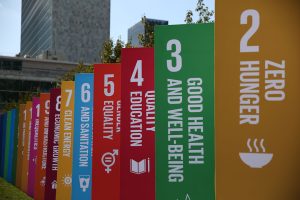By Alice Whitehead, Bond
The UK played an important role on the global stage in developing the 2030 Agenda and the SDGs. It has claimed that it “will be at the forefront of delivering them,” but this is far from what we in UK civil society see in reality. In recent years, progress towards implementing the 2030 Agenda’s ambitious and transformative goals – both in the UK and around the world – has been disappointing.
It has now been more than two and a half since years the UK government presented its Voluntary National Review (VNR) to the UN High-Level Political Forum (HLPF). Since July 2019, the context has changed significantly for UK civil society. The COVID-19 pandemic has put back progress on achieving the SDGs, pushing millions into poverty, exposing inequalities, disrupting children’s education, and putting pressure on already weak health systems, exacerbating the very problems the SDGs were designed to address.
In 2021, the UK Government also reneged on its commitment to spend 0.7% of GNI on Official Development Assistance (ODA), dropping this to 0.5%, which amounts to a projected real-terms cut of over £4 billion in 2021. This decision has crippled many lifesaving and life-transforming projects around the world with serious implications for the world’s most marginalised communities and for the achievement of the SDGs.
During this turbulent time, we have also seen the merger of the highly respected Department for International Development (DFID) with the Foreign and Commonwealth Office (FCO), with severe implications for the implementation of UK aid programmes. The UK Government also published its vision for international policy in the shape of the Integrated Review, which will affect how the Government resources and implements international development moving forward.
Despite these multiple and seismic changes in the UK, we are yet to see any meaningful progress on the commitments the UK made in its 2019 VNR, and still the UK government has not committed to a second VNR. As a result, progress on SDG implementation is stalling.
A recent report coordinated by Cooperation Canada and written by a coalition of 13 civil society organisations reviewed the 42 VNRs presented in 2021 and highlighted global trends and good practice regarding national SDG implementation.
Here are four ways in which UK civil society finds that the UK is falling behind the countries who reported in 2021:
- Leadership. Good governance and institutional mechanisms are the basic building blocks for any country trying to implement the SDGs in an inclusive and effective way. Where governments assign leadership for implementing the SDGs indicates the level of political commitment as well as lines of accountability. Leadership on the SDGs around the world usually resides with Heads of States, but this is not the case in the UK. As a result, ambition and commitment to SDG implementation is insufficient, and there is a lack of ownership and understanding of the SDGs in most government departments.
- Stakeholder engagement. Consulting and engaging with non-state actors, such as civil society organisations, ensures a whole-of-society approach to implementing the SDGs. The vast majority of countries reporting in 2021 make use of formal and informal mechanisms for engagement. The UK Government, meanwhile, despite committing to establishing a stakeholder engagement mechanism in 2019, has yet to take action to establish this critical implementation tool.
- Implementing the Leave No One Behind promise. In 2019 the UK outlined its promise to leave no one behind, where it pledged to commit to putting the last first. However, since then, we have seen an alarming lack of political commitment to carrying out these plans. In 2021 the UK government published its national planning framework, with no mention in any of department’s plans of how they will help to implement the government’s promise to Leave No One Behind. Also, while the UK Office for National Statistics (ONS) has published its Action Plan to implement the Inclusive Data Charter, the UK Government, as one of the Charter’s earliest champions, is yet to publish a whole-of-government action plan with clear guidelines of how it will monitor progress on the Charter.
- Policy coherence. Policy coherence is critical to ensure that action in one area does not undermine progress in another. Currently, UK development assistance is undermined by other UK investments and strategies across a range of sectors and themes. Last year, when the UK government published its national planning framework, it missed an opportunity to resolve this through critical analysis about how each government department’s plans affect the other, or how domestic policies affect the UK’s work internationally.
It is critical that the UK make progress on the areas outlined above, and this must include establishing a multi-stakeholder engagement mechanism to identify gaps, adapt policies, and target areas where further progress is needed, to ensure no one is left behind.
We are almost halfway to 2030. Although the pandemic has set back progress on the SDGs, it has also shown us just how interconnected the Goals are. World leaders need to be bold, and many are now asking how to deliver transformative change as we begin to rebuild from the pandemic. Now is the time for the UK to step up and start delivering.
This guest article is authored by Alice Whitehead, Public Affairs and SDGs Policy Adviser, at Bond (the UK network of NGOs).

